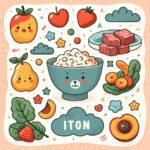Finding Dairy-free calcium sources for breastfeeding mothers is crucial for ensuring both the mother’s and baby’s health during this nurturing phase. Calcium plays a pivotal role in bone health and is essential for baby’s development and mother’s well-being. However, for those who follow a dairy-free diet, either due to personal choice or allergies, sourcing calcium can seem challenging. This article delves into various dairy-free calcium-rich foods and supplements, providing a comprehensive guide for breastfeeding mothers.
Understanding the Importance of Calcium During Breastfeeding
During breastfeeding, the demand for calcium significantly increases as it supports the baby’s skeletal development and the mother’s bone health. The National Institutes of Health recommends that breastfeeding mothers consume at least 1,000 mg of calcium daily. A deficiency in calcium can lead to weakened bones and increased risk of osteoporosis later in life.
Moreover, calcium plays a critical role in muscle function, nerve signaling, and blood clotting. Ensuring an adequate intake of calcium is, therefore, non-negotiable for the health and recovery of breastfeeding mothers. But how can one meet these needs without dairy? Let’s explore.
Dairy-free Calcium Sources for Breastfeeding Mothers
Thankfully, numerous dairy-free foods are rich in calcium, catering to breastfeeding mothers following a dairy-free diet. Here are some top choices:
- Fortified plant-based milks (almond, soy, rice, and oat milk)
- Green leafy vegetables (kale, collard greens, and broccoli)
- Almonds and sesame seeds
- Tofu and tempeh (make sure they are calcium-set)
- Figs and oranges
- Calcium-fortified cereals and bread
Integrating these foods into your daily diet can help ensure you’re getting enough calcium. For instance, incorporating green leafy vegetables into smoothies or snacks can be a straightforward way to increase your calcium intake.
Additionally, some plant milks are enriched with calcium, making them an excellent alternative to dairy milk. Reading labels is key to ensuring you choose products fortified with calcium. For more information on dairy alternatives, consider reading Dairy Alternatives for Toddlers with Lactose Intolerance.
Supplementation and Absorption Tips
While dietary sources are the best way to obtain calcium, some breastfeeding mothers may find it challenging to meet their calcium needs through diet alone. In such cases, calcium supplements can be a viable option. However, it’s important to consult with a healthcare provider before starting any supplementation to determine the appropriate dosage and ensure it doesn’t interfere with other nutrients’ absorption.
Enhancing calcium absorption is also critical. Vitamin D plays a crucial role in calcium absorption, so ensuring adequate Vitamin D levels through sunlight exposure or supplementation is important. Moreover, spreading calcium intake throughout the day can improve absorption, as the body can only absorb a limited amount of calcium at a time.
For additional tips on maintaining hydration and nutritional balance while breastfeeding, Hydration Tips for Breastfeeding Mothers offers valuable insights. Ensuring proper hydration is integral to optimizing nutrient absorption, including calcium.
In conclusion, finding Dairy-free calcium sources for breastfeeding mothers is not only possible but also varied. By incorporating a mix of calcium-rich foods into your diet and considering supplementation if necessary, you can meet your calcium needs and support your health and your baby’s development. Remember, every mother’s journey is unique, so it’s important to tailor dietary choices to your specific needs and preferences.
To further support your journey, exploring resources such as Nutritional Needs for Premature Babies: A Comprehensive Guide and Vegan Baby Nutrition Plan for the First Year can offer additional guidance tailored to your lifestyle and your baby’s needs.













